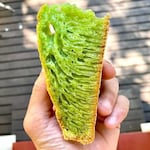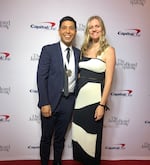Each year, some of the most exceptional talents in the food world are recognized at the James Beard Awards. It’s sometimes called “the Oscars of food” and its namesake was a Portlander who laid the groundwork that put American chefs and cuisines on an international stage.
This year, Portland took home more James Beard Awards than any other city. Among them was a win for Best Chef: Northwest and Pacific, won by Vince Nguyen. His restaurant Berlu serves a contemporary Vietnamese tasting menu seen through the lens of the Pacific Northwest
Nguyen spoke with “All Things Considered” host Crystal Ligori about the win and how he’s reconnecting with Vietnamese cooking.

Chef Vince Nguyen winning the James Beard Award for Best Chef: Northwest & Pacific, on June 5, 2023, in Chicago.
Courtesy of Vince Nguyen
Crystal Ligori: Can we start with a look back about how you got into the food world? Because I heard you were actually on track to be a doctor at first.
Vince Nguyen: Oh my gosh, I haven’t said this story in a long time… So all my family [were] doctors, lawyers, so that was kind of my trajectory. Just after I finished my undergrad, at the time, I was working at a catering company [as] a server. One day, someone in the kitchen just didn’t show up and — me being the youngest — they said, ‘Hey, can you help them out?’ And I was like, ‘Sure.’ So I’m back there in a tuxedo [and] I don’t remember what they had me do, but apparently I fell in love with it. And I actually dropped out of school and signed up for culinary school two weeks later, so it was a pretty quick transition.
Ligori: You opened Berlu only a few months before COVID ended up shuttering restaurants and then you made a pretty big pivot to Berlu Bakery. Can you talk about that shift?
Nguyen: During the pandemic, I started cooking more Vietnamese food. We didn’t really grow up eating much Vietnamese food, but we had a large family. So there’s definitely family that were raised in Vietnam and had a very traditionally Vietnamese upbringing. And one of our cousins was actually a baker and she would make my sister — per my sister’s request — this green cake for her birthday every year. I came across a recipe [for] bánh bò nướng and I thought that was the cake that my sister was requested. So I made it, it came out and looked gorgeous and it was super tasty. I sent her a picture [and] was like, ‘Hey, look what I made!’ She was like, ‘What is it?’ Like, ‘What do you mean what is it? It’s the cake you always wanted.’ She’s like, ‘No it isn’t.’ So I guess what she wanted was like a chiffon pandan cake. But that started it because I’ve never baked before. I did the desserts at Berlu but never had any formal baking experience. So this was super delicious and I gave it to my neighbors who were Westerners, who grew up eating croissants and just traditionally western desserts and they loved it. And I’m like, ‘hmm, maybe I’m on to something.’ This is so delicious and to the point where it’s just undeniably delicious.

A slice of pandan bánh bò nướng from Berlu Bakery. Chef Vince Nguyen pivoted to creating Vietnamese baked goods when the pandemic shuttered his restaurant.
Courtesy of Vince Nguyen
Ligori: How did it feel to sort of rediscover this cuisine that is part of you, but that you were distant from for so long?
Nguyen: There were always Vietnamese or Asian elements in my tasting menus, but I never embraced it. So after COVID, after cooking, we decided to really embrace it. And I think it really helped me improve as a chef made my food more dynamic. And it just gave a little more clarity, a little more direction.
Ligori: Were you reaching out to that extended family to be like ‘What was that thing that we ate that one time?’
Nguyen: Yeah [and] it was actually a lot of fun. We had the bakery but we offered different soups, savory items. So I’d always reach out to my dad, reach out to my mom, and during the winter and the fall when it was really cold, we were doing a different soup every week and that was a huge challenge. I’d reach out like, ‘Hey, what kind of soup has pork?’ or like, ‘What kind of soup has duck?’ or something like that. And they would tell me and then they would explain the flavors. And I would always put my own touch, tailor them to more of a Western palate. The fermented flavors were a little more subtle, some others were a little more forward and a little more balanced. So we never claimed to be truly authentic, but I think there were elements that really connected on a nostalgic level with some of the diners that grew up eating Vietnamese food or eating those dishes. So even though I had never tried some of these dishes, I still understood the dishes just by the recipes and talking with my parents.
Ligori: I love the idea of hearing about something and not ever having tasted it, but you’re like, ‘Yes, I get the vibe of that.’ And then with your culinary experience, you’re creating it with your own spin.
Nguyen: Yeah, and there are certain things that are definitely specific to Vietnamese cuisine that you have to try to understand. So it was fun to have the realization that you know what I did kind of eat a lot of Vietnamese food, I just didn’t really pay attention or didn’t care to remember it. But a lot of the foods I ate kind of brought back some nostalgic memories for myself, which was really special.

Chef Vince Nguyen and his wife, Mallory, pose during the James Beard Awards on June 5, 2023, in Chicago. Nguyen owns Berlu in Portland and won Best Chef: Northwest & Pacific.
Courtesy of Vince Nguyen
Ligori: How does it feel to take home a James Beard Award and have this recognition for Vietnamese cuisine?
Nguyen: It’s truly an honor. I don’t think it’s really hit me yet, to be honest. All my greatest mentors have won James Beard Awards [and] for me to win, it doesn’t make me feel like I’m on their level at all. But it’s really special to share with those that have supported me over the years. Any victory of mine, it feels like a victory for them. And I didn’t cook Vietnamese food beforehand because I wasn’t really proud of my heritage. I wasn’t proud to be Vietnamese and it wasn’t until I started my own business where I was being supported by Vietnamese people just because I was Vietnamese. It really empowered me and it made me realize I should be proud of my heritage. And I’m grateful that I have the platform to express that pride and it’d be an honor if I were to inspire someone to have those same feelings.


